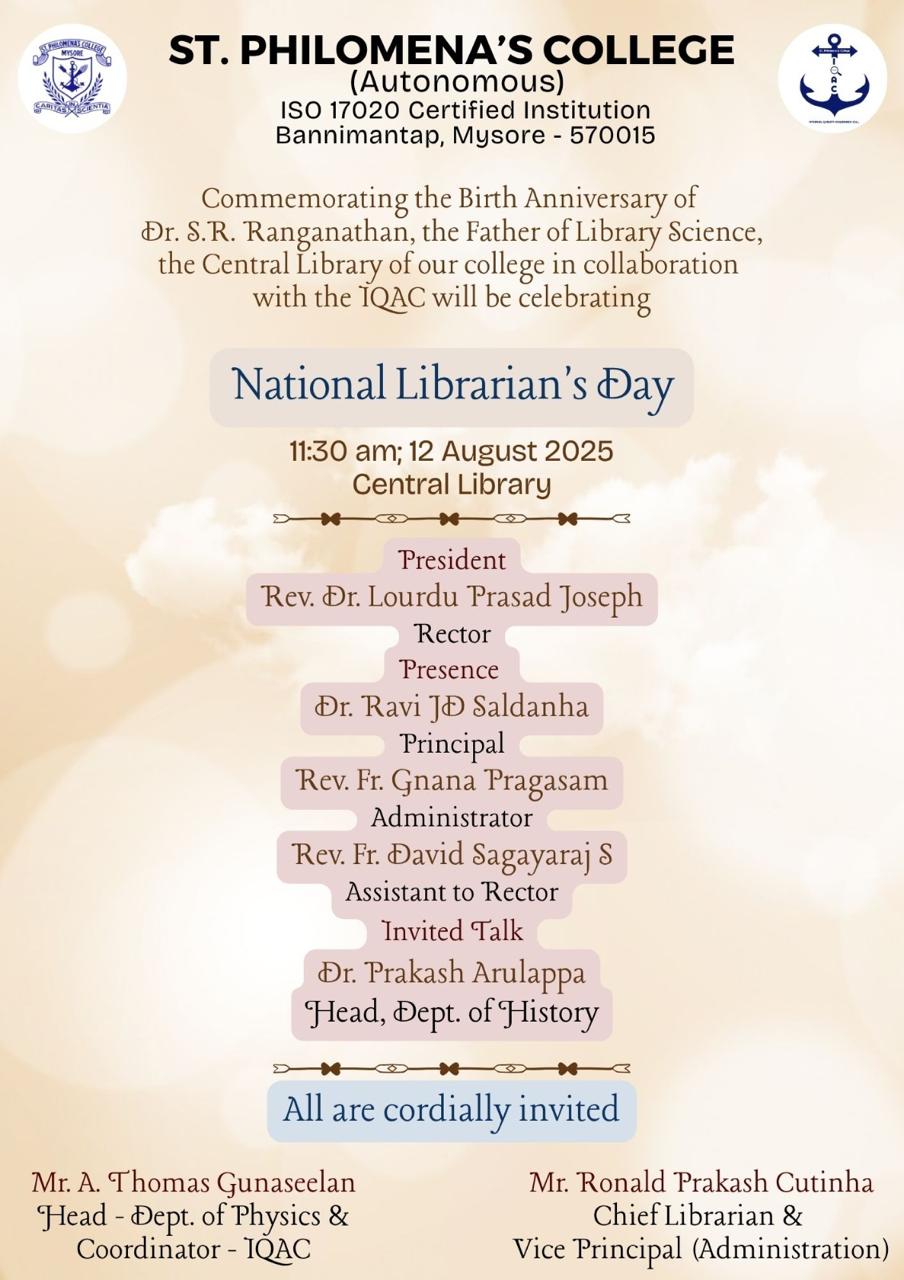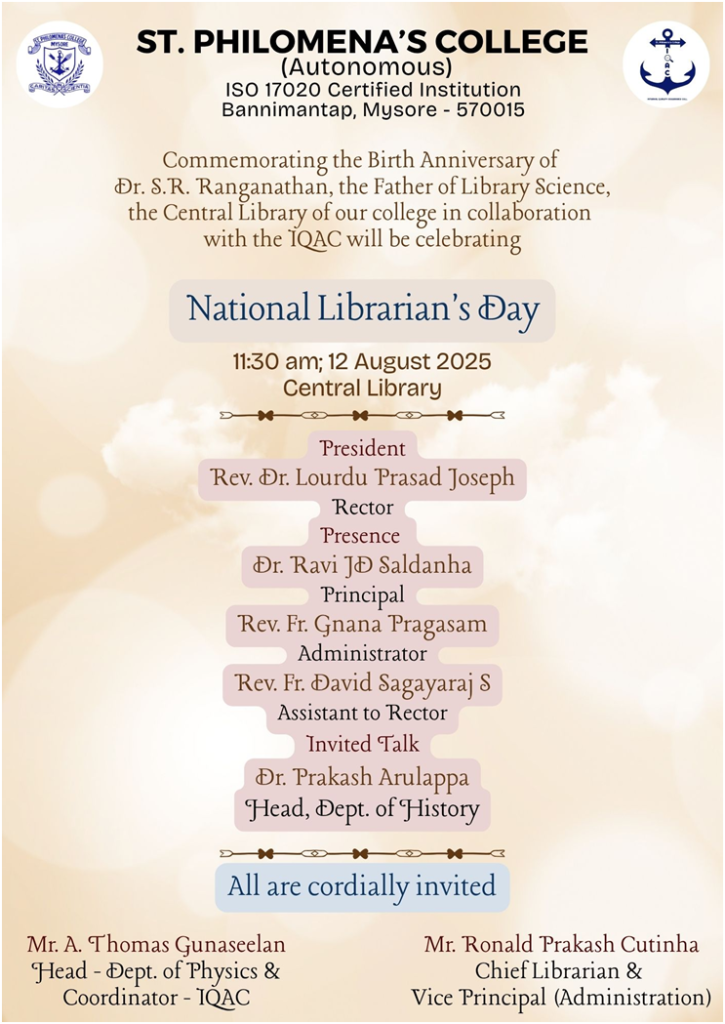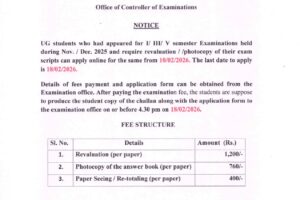
National Librarian’s Day
Report: National Librarian’s Day 2025
Organized by:The Central Library in collaboration with the Internal Quality Assurance Cell (IQAC), St. Philomena’s College (Autonomous), Mysore
Date & Time: 12 August 2025, 11:30 AM
Venue: Central Library
Occasion: Commemoration of the Birth Anniversary of Dr. S.R. Ranganathan
Theme:Libraries as Pillars of Knowledge and Cultural Continuity

Report
Institutional Context
St. Philomena’s College, Mysore—an ISO 17020 Certified Institution—has long stood as a beacon of academic excellence and holistic education. Guided by its motto Caritas in Scientia (Love in Knowledge), the college fosters a vibrant intellectual community that values tradition, innovation, and service.
The celebration of National Librarian’s Dayis a reflection of this ethos. Held annually on August 12th, the event honors Dr. S.R. Ranganathan, whose visionary contributions laid the foundation for modern library science in India. His Five Laws of Library Science continue to influence global library practices:
- Books are for use
- Every reader his/her book
- Every book its reader
- Save the time of the reader
- The library is a growing organism
Dignitaries and Organizers
The event was graced by distinguished members of the college leadership:
Their presence underscored the college’s commitment to academic stewardship and the enduring value of libraries in shaping scholarly and civic life.
| Name Designation Rev. Dr. Lourdu Prasad Joseph Rector & President of the Event Dr. Ravi JD Saldanha Principal Rev. Fr. Gnana Pragasam Administrator Rev. Fr. David Sagayaraj S Assistant to Rector Mr. Ronald Prakash Cutinha Chief Librarian & Vice Principal (Admin) Mr. A. Thomas Gunaseelan Head, Dept. of Physics & IQAC Coordinator |

Invited Talk: Dr. Prakash Arulappa
Designation: Head, Department of History
Topic:“Libraries as Knowledge Hubs: Preserving the Past, Empowering the Future”
Dr. Prakash Arulappa delivered a deeply engaging and intellectually rich address that explored the multifaceted role of libraries across time and disciplines. His talk was structured around five thematic pillars:
1️⃣ Libraries as Custodians of Civilizational Memory
Dr. Arulappa began by tracing the historical lineage of libraries, from the clay tablets of Mesopotamia to the palm-leaf manuscripts of ancient India. He emphasized:
- The Library of Alexandria as a symbol of ancient intellectual ambition.
- The Nalanda University Library, which housed thousands of manuscripts and attracted scholars from across Asia.
- The role of temple libraries and monastic archives in preserving religious and philosophical texts.
He argued that libraries are not merely storage spaces but living archives—repositories of human thought, creativity, and cultural identity.
2️⃣ Libraries in the Age of Digital Transformation
Transitioning to the present, Dr. Arulappa examined how libraries are evolving in response to technological shifts:
- Digitization of rare manuscripts to prevent deterioration and enable global access.
- Use of metadata and digital cataloging systems to enhance discoverability.
- Integration of AI and machine learning for personalized recommendations and semantic search.
He cautioned, however, that digital access must not replace the tactile and contemplative experience of physical libraries, which offer a unique space for reflection and serendipitous discovery.

3️⃣ Libraries as Democratic Spaces of Learning
Dr. Arulappa passionately advocated libraries as egalitarian institutions:
- They serve as safe havens for inquiry, especially for marginalized communities.
- Libraries promote intellectual freedom, resisting censorship and ideological control.
- They foster interdisciplinary dialogue, bridging gaps between science, humanities, and the arts.
He cited examples of community libraries in rural India that empower local populations through literacy programs and access to information.
4️⃣ Ethical Stewardship and the Librarian’s Role
The speaker paid tribute to librarians as guardians of truth and curators of knowledge:
- Librarians must uphold ethical standards in information management.
- They play a critical role in countering misinformation and guiding users to credible sources.
- The profession demands empathy, precision, and a deep understanding of user needs.
Dr. Arulappa called for renewed respect and investment in library science education, emphasizing that librarians are not passive custodians but active educators and facilitators.
5️⃣ Vision for the Future: Libraries as Cultural Ecosystems
In his concluding remarks, Dr. Arulappa envisioned libraries as dynamic ecosystems:
- Spaces for collaborative learning, maker labs, and digital storytelling.
- Hubs for cultural programming, including exhibitions, author talks, and oral history projects.
- Anchors of sustainability and resilience, preserving knowledge across generations.
He invoked Dr. Ranganathan’s Five Laws as a timeless framework for reimagining libraries in the 21st century—not just as institutions, but as living organisms that adapt, grow, and inspire.
Reflections and Impact
The event left a profound impression on attendees, especially students and faculty members who were reminded of the transformative power of libraries. It reinforced the idea that libraries are not relics of the past but engines of progress, capable of shaping informed, empathetic, and critically engaged citizens.
The collaboration between the Central Library and IQAC exemplifies the college’s integrated approach to quality assurance and academic development.
Presidential Remarks: Rev. Dr. Lourdu Prasad Joseph, Rector
In his address as President of the event, Rev. Dr. Lourdu Prasad Joseph delivered a thoughtful and inspiring message that underscored the enduring relevance of libraries in the modern academic landscape. Key highlights of his remarks included:
- Tribute to Dr. S.R. Ranganathan: He praised Ranganathan’s visionary contributions, particularly the Five Laws of Library Science, which continue to guide library professionals worldwide.
- Libraries as Sanctuaries of Learning: He emphasized that libraries are not just repositories of books but sacred spaces where knowledge is nurtured, curiosity is cultivated, and values are shaped.
- Call to Action: He encouraged students and faculty to make full use of library resources, not just for academic success but for personal growth and lifelong learning.
- Institutional Commitment: He reaffirmed the college’s dedication to strengthening its library infrastructure and supporting initiatives that promote reading, research, and intellectual engagement.
His words set a tone of reverence and enthusiasm for the rest of the program, reminding everyone of the spiritual and scholarly dimensions of library culture.
Role of the Chief Librarian: Mr. Ronald Prakash Cutinha
As Chief Librarian and Vice Principal (Administration), Mr. Ronald Prakash Cutinha played a pivotal role in orchestrating the event. His contributions were multifaceted and deeply impactful:
Master of the Ceremony
Mr. Cutinha served as the Master of the Ceremony, seamlessly guiding the flow of the program with clarity, warmth, and professionalism. His stewardship ensured that each segment of the event was executed with precision and grace.
Welcome Address
He formally welcomed the gathering, extending heartfelt greetings to the dignitaries, faculty, students, and guests. In his welcome speech, he:
- Reflected on the significance of National Librarian’s Day.
- Highlighted the contributions of the Central Library to the academic life of the college.
- Expressed gratitude to the IQAC and college leadership for their support in organizing the event.

Facilitating the Talk
He introduced the invited speaker, Dr. Prakash Arulappa, with a brief yet eloquent overview of his academic background and contributions to historical scholarship. His introduction set the stage for a deeply engaging lecture.

Vote of Thanks
At the conclusion of the program, Mr. Cutinha delivered a formal vote of thanks, expressing appreciation to:
- The college leadership for their presence and encouragement.
- Dr. Prakash Arulappa for his insightful and thought-provoking talk.
- The organizing team, including library staff and IQAC members, for their dedication.
- The audience for their enthusiastic participation and respectful attention.
His closing remarks were gracious and reflective, reinforcing the spirit of gratitude and intellectual camaraderie that defined the event.

Institutional Commitment
St. Philomena’s College, an ISO 17020 Certified Institution, continues to uphold its motto Caritas in Scientia—Love in Knowledge—by fostering a culture of academic integrity and innovation. The celebration of National Librarian’s Day is a testament to its dedication to honoring intellectual heritage and inspiring future scholarships.










